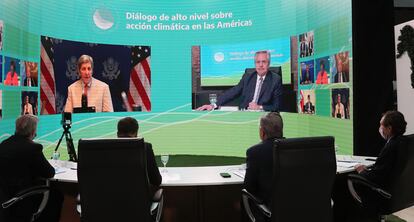On the screen, the president of Argentina, Alberto Fernandez, and the special envoy for the United States Climate, John Kerry.- / AFP
No country in Latin America is among the ten most polluting in the world, but the region with the greatest biodiversity in the world suffers like few others from the consequences of climate change.
In order to face this global challenge, several Latin American leaders have today requested financing from international organizations and swaps of foreign debt in exchange for environmental results during the Latin American Summit on climate change held this Wednesday virtually.
More information
Honduras, the zero zone of climate change in Latin America
What does Latin America and the Caribbean contribute to the Climate Summit
“There is no ecological crisis unrelated to the social crisis and unrelated to the need to rethink the pillars of the international financial architecture. We need financing and new rules so that the transition is fair, ”Argentine President Alberto Fernández said at the opening of the meeting. The host
of the High-Level Dialogue on Climate Action in the Americas
called for tax incentives for sustainable activities and jobs that contribute to building a circular economy and reducing greenhouse gas emissions, among other international goals.
“The jobs of the future will be sustainable.
If not, they will not be, ”said Fernández.
He also requested that international development organizations link at least 50% of their loan portfolios to environmental actions and the construction "of a new economy that discards the policy of discarding."
🖥️ "It is about listening to the cry of our land and peoples. It is here and now, together we can be the generation that tried to save the planet, separated from global greed."
President @alferdez at the Latin American Summit on Climate Change.
pic.twitter.com/iZNhTsJY1R
- Alberto Fernández Prensa (@alferdezprensa) September 8, 2021
In his speech he highlighted the urgency of a planetary change, but did not put on the table concrete commitments, except for the 2% increase in his contribution to climate and environmental action that he will formalize at the world climate summit to be held in Glasgow from October 31st. Other leaders, on the other hand, detailed the roadmaps designed to fight climate change, such as the Colombian Iván Duque, who plans to plant 180 million trees by 2022 and reduce current emissions by 51% in 2030.
The special envoy for the Climate of the United States, John Kerry, did not evade the responsibility of his country, second in the world polluter behind China. "Unless each of the countries does not do enough, and particularly the top 20 issuers that are responsible for 80% of the world's emissions, the rest of the world is going to be doomed for their actions or for their inaction." The United States aims to cut emissions in half by 2030 and five years after all its electricity production comes from carbon-free sources and 50% of its automobile fleet is electric.
The Secretary General of the United Nations, António Guterres, agreed with the Argentine president on the need for changes in the development financing system: “It must offer options that link climate action with debt sustainability in order to create jobs work and alleviate the difficulties that debt generates ”. Duque also asked for financial solutions, such as establishing a debt forgiveness system for environmental objectives achieved or including sustainability in the production criteria.
The representatives of the island countries, those most affected by the rise in the water level and by extreme weather events, were the most forceful in demanding a change of helm. "What has to change for us to save ourselves and the planet?" The president of Costa Rica, Carlos Alvarado, launched into the air. “The reality of nature is being very clear. We see floods, forest fires, glaciers are melting, there is loss of biodiversity ... Ironically this year the world's military spending grew again. Where is the world's priority? We are arming ourselves for an armed conflict when our main threat is the survival of our common home, ”he said.
"We are disappointed," Barbados Prime Minister Mia Amor Mottley had said minutes earlier, after recounting the consequences of Hurricane Elba on this Caribbean island last July, which destroyed hundreds of homes, schools, hospitals and other buildings.
Mottley said that the small Central American countries have not caused the climate crisis, but its consequences force them to go into debt in order to rebuild over and over again.
Also participating in the summit were Laurentino Cortizo Cohen for Panama, Luis Abinader (Dominican Republic), Mario Abdo Benítez (Paraguay) and the president of COP25 and Minister of the Environment of Chile, Carolina Schmidt, as well as the president of COP26, Alok Sharma.
You can follow CLIMA Y MEDIO AMBIENTE on
and
, or sign up here to receive
our weekly newsletter

